Steph W. from SEOPressor


...help you check your website and tell you exactly how to rank higher?




...help you check your website and tell you exactly how to rank higher?



SUBSCRIBE TO SEOPressor BLOG
Join 50,000+ fellow SEO marketers!
Get SEOPressor latest insights straight to your inbox.
Enter your email address below:
97
score %
SEO Score

Found us from search engine?
We rank high, you can too.
SEOPressor helps you to optimize your on-page SEO for higher & improved search ranking.
By winniewong on January 10, 2018

Time to nail it.
At one point or another, content producers and writers may find it difficult to determine the exact length when producing online contents. There is a big possibility that these questions have got you wondering before:
More often than not, many of us have to depend on our instinct and experience to figure out the answers to the questions above. The good news is, a solid research has been done on the topic of ideal length and there is information available about the value of writing or posting at certain lengths. Following the ideal lengths for every online content might just save you from the clutter.
Nobody wants to put limits on one’s creativity, but having guidelines backed by research will help make sure your posts are seen by the most amount of people and result in higher engagement. Remember, every character counts.
Here comes the answer.
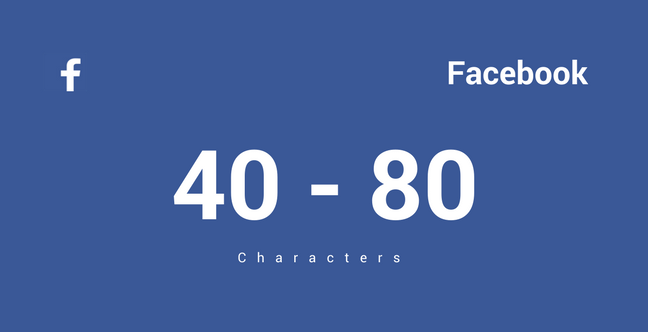
There was a time when the Facebook status length was limited to less than 420 characters. That all changed when the social networking giant has decided to increase the facebook post length limit to 63, 206.
When you post on Facebook, you’re competing with thousands of other brands for your audience’s attention. Not only that, but the amount of attention your audience has available to give you is limited. With all of this going against you, brands need to do whatever they can to stand out and grab their audience’s attention. Make it too short and you risk getting overlooked. Go too long and you might reach the Facebook character limit. So what’s the sweet spot for the length of a Facebook post?
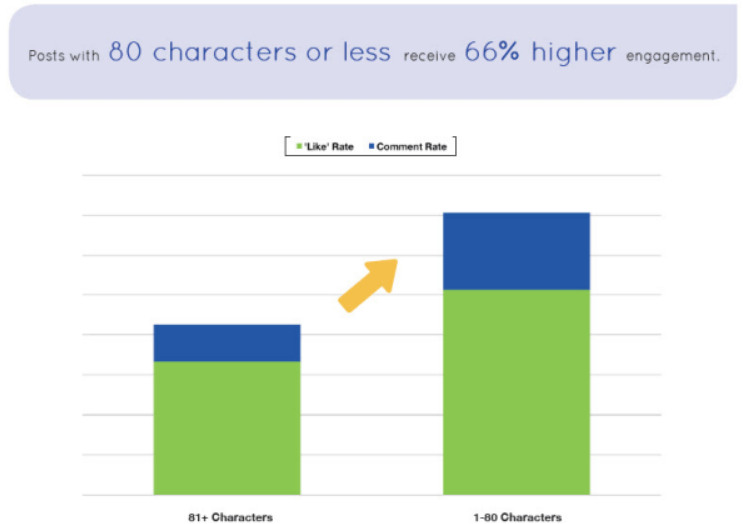
Studies show that posts containing 80 characters or less earn a higher engagement. The key is to keep your posts short and concise. Longer posts get cut off in a user’s feed which forces them to expand them the text if they want to read the full story. It’s more difficult than ever to get your audience’s attention on Facebook when they are being bombarded with news all the time. So, the easier it is for them to see your message, the stronger your chances of getting them to bite on your posts.
Ideal Length of A Facebook Update: 40 – 80 characters
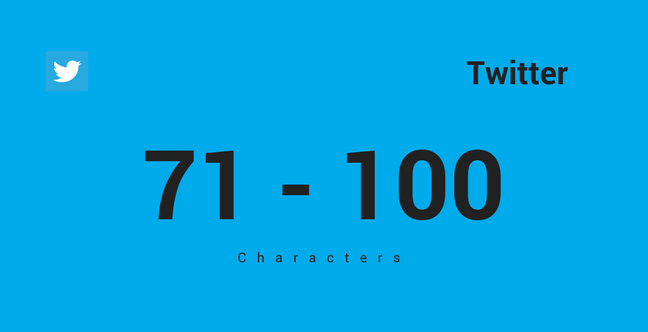
Twitter has more than 284 million users and the platform sees 500 million tweets daily. For years, Twitter was famous for imposing the 140 character limit. If you haven’t known already, in 2017, the network increased the limit to 280 characters. In order to determined the optimal length of a tweet, why go anywhere else when Twitter has the answer to your question?
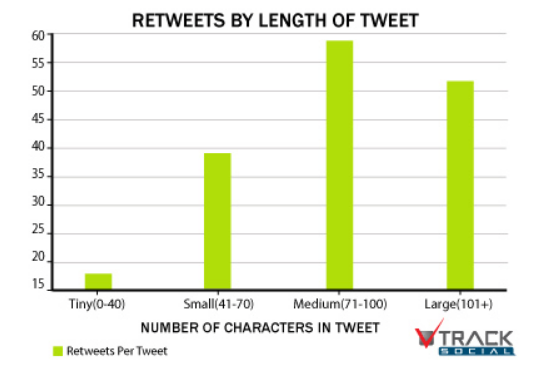
If you’re thinking to yourself, “71-100 characters is really short,” you’re right. Getting your Tweets down to under 100 characters can be challenging at first, but the positive side is it forces you to be concise. Being succinct and clear is key for Twitter since it moves ever so quickly. You literally only have seconds to catch your audience’s attention. A tad bit harder than on Facebook.
Ideal Length of a Tweet: 71 – 100 Characters
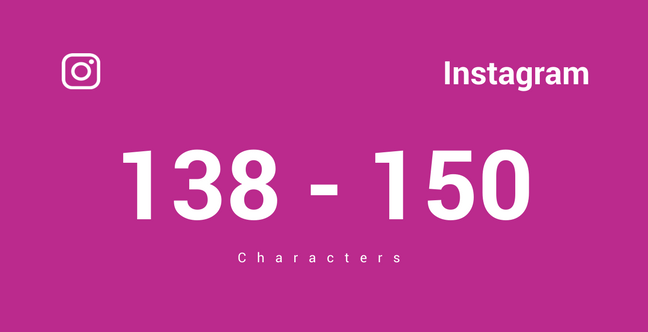
Like most brands, you may have never even thought of character limits on Instagram. If you’ve read through captions of the top brands, you’ll notice they tend to run on the shorter side.
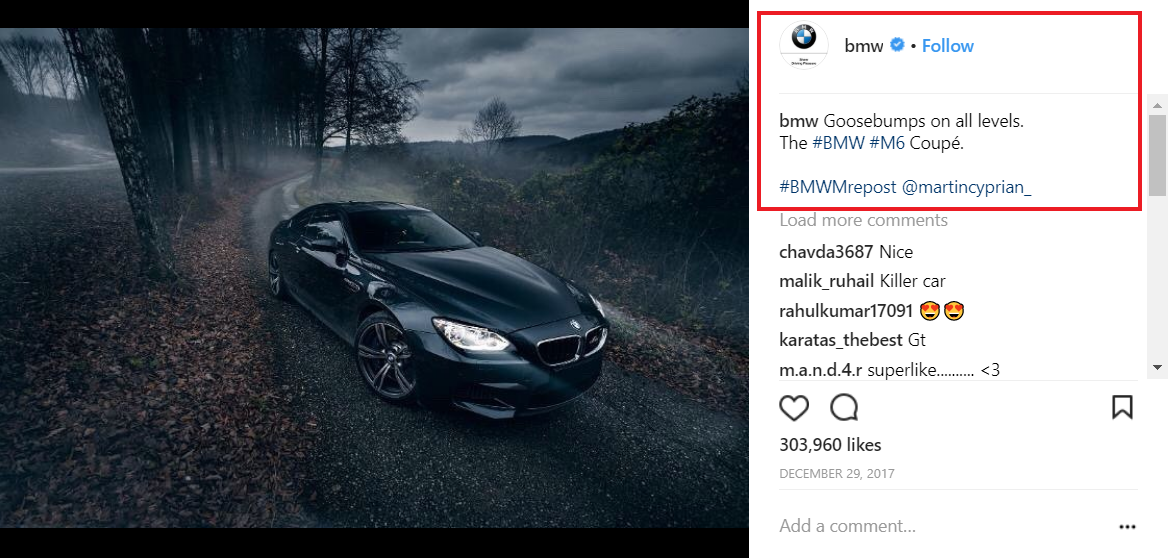
To maximize engagement on your Instagram posts, stick to 138-150 characters in your captions. While posts can be 2,200 characters long, Instagram isn’t really focused on text-based content but rather great visuals. Nonetheless, captions provide context and can compel people to engage with you. Just the first three lines of a post appears in users’ feeds, so front load your caption and leave extraneous information for the end. So do everything you can to make your captions as great as possible.
Ideal Length of Instagram Captions: 138 – 150 Characters
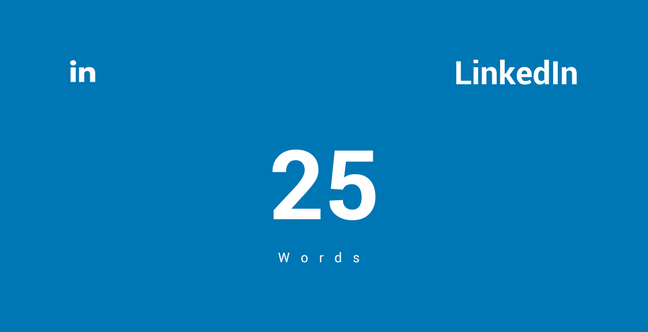
LinkedIn dominates the professional social network segment. It is one of the oldest having started in 2002. Almost the grandfather of social networks. Generally, LinkedIn updated will link to an article rather than it being a stand-alone piece.
LinkedIn is different from all the platforms mentioned above, in that it’s not as visual, When you take a look at status updates on LinkedIn, you’ll notice that most consist of a headline and a link to an article. So it’s not a surprise that the optimal length of a LinkedIn status update is about 25 words.
There are also a number of guidelines around the length of articles on the publishing platform.Headlines should stick between 150 characters or less and the body should not exceed 120,000 characters.
Ideal Length of LinkedIn Status Update: 25 Words
Ideal Length of LinkedIn Post: 500 – 1,200 Words
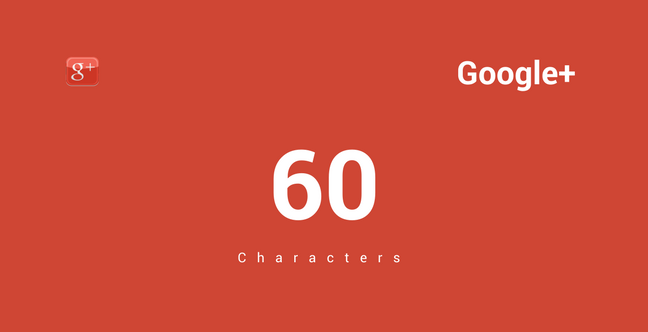
On Google+, the audience there is highly engaged and they have a low tolerance for spam. So don’t expect to phone it in or put your Google+ activity on autopilot and get a good response. But when you take the time to put a little craftsmanship into your posts, it really pays off.
The limit per post for Google+ appears is 100,000. It is best to keep your Google+ text within one line as it enhances the appearance and readability of your posts. In the last update, Google changed the layout of posts so that you only see three lines of the original post before you see the “Read More” link. In other words, your first sentence has to be a gripping teaser to get people to click “Read More”.
Ideal Length of Google+ Headlines: 60 Characters
Ideal Length of Google+ Content: 200 – 400 Characters
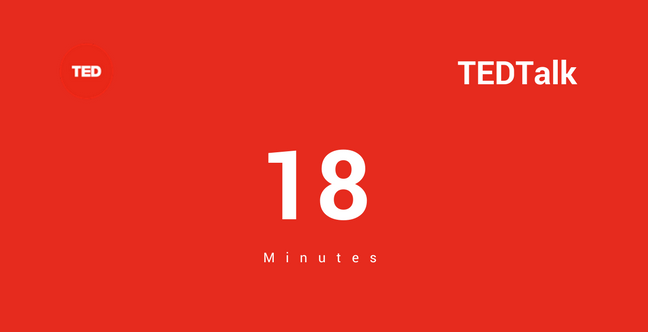
Those of you who had the experience to do a presentation might have asked yourself this question before: “When I’m giving a talk, how long should my presentation be?”. If you don’t know the answer to it previously, fret not because I’m about to tell you the optimum length of a presentation.
Now, are you familiar with TED Talks I’m pretty sure you do given the fact that the videos are streamed more than 2 million times per day. But, have you ever wondered why are most of the presentations maintained at about 18 minutes? Just so you know, there is a scientific reasoning behind it.
The reason behind the magic number is the factor that leads to TED Talk’s immense success. Scientists are beginning to identify how long most people can pay attention before they tune out. The result? Most of us switch off at around the 10 – 18 minute mark.
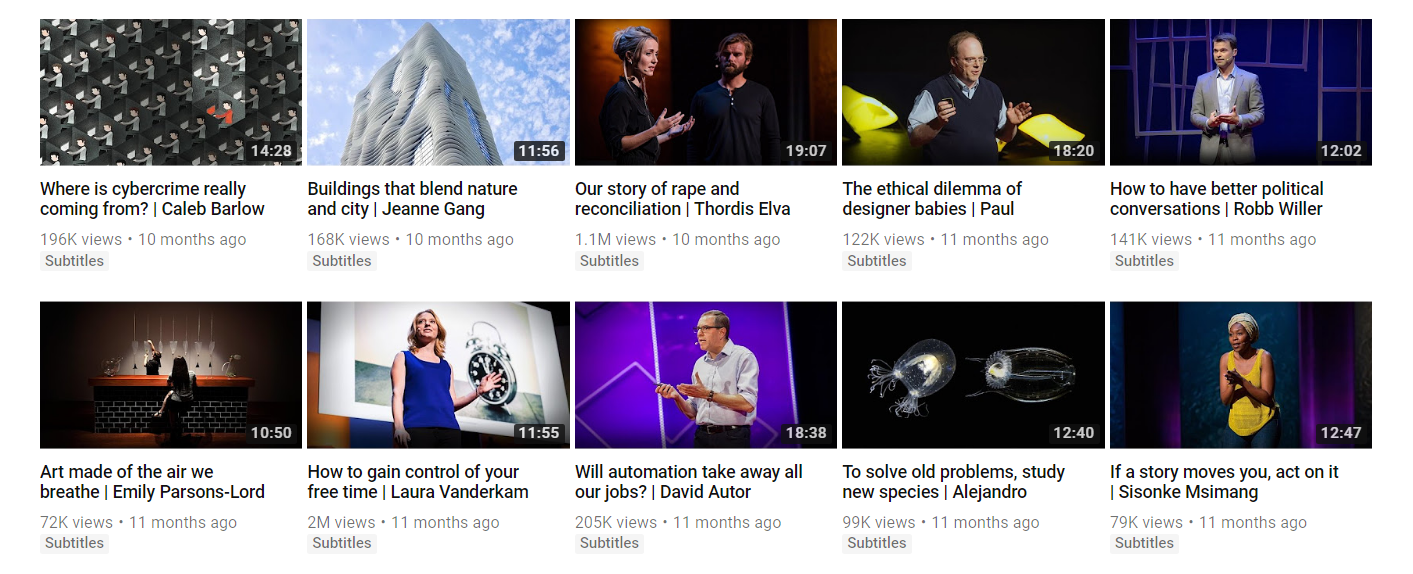
The 18-minute rule also works because the brain is an energy hog. The average adult human brain only weighs about three pounds. As the brain takes in new information and is forced to process it, millions of neurons are firing at once, buring energy and leading to fatigue and exhaustion. At the same time, it also teaches the presenters on the epitome of discipline.
Tell everything and they’ll remember nothing. 18 minutes is short enough to hold people’s attention, including on the Internet and precise enough to be taken seriously. But it’s also long enough to say something that matters.
Ideal Length of Presentations: 18 minutes
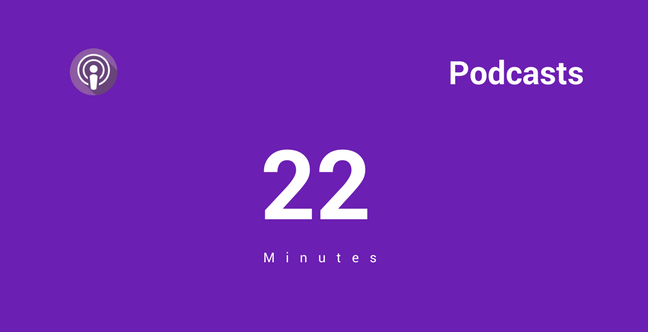
Podcasts have a lot of freedom: no gatekeepers, fewer rules and no broadcast schedule dictating how long or short each episode needs to be. As a result, podcasts range from as short as a minute to as long as 3 hours. But what do listeners want? Can tweaking your episode length get you more listeners?
If you look closely, some popular podcasts are 60 seconds, others are several hours. The top 10 business podcasts range from 15 minutes to an hour, averaging 42 minutes. According to a research by Stitcher, the average podcast listener stays connected for 22 minutes on average.
It isn’t surprising as studies show students zone out after 15 – 20 minutes of lecture time. After 20 minutes, attention and retention rates crash. Nonetheless, don’t get so tied up with the length instead, make the show you want to make and one that you’re capable of making on a regular basis.
Ideal Length of Podcasts Per Episode: 22 minutes
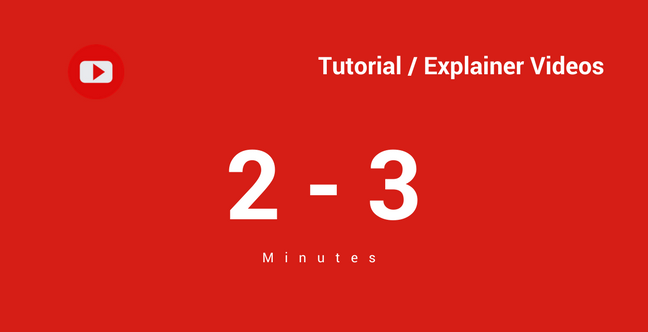
There are various types of tutorials out there. Let’s talk about the most common type of videos – the tutorial, or informational video. The main goal of a tutorial is not to show how something works in absolute detail, but just to give an overview of it in today’s fast-paced world. That also means that the video ought to be short and simple.
Like it or not, your audiences have better things to do with their time and it’s easy for them to navigate away from your video to do something else it is too long. Too many web videos this days are losing videos before they even get to the point.
Here’s a 2.5 minute video from SEOPressor Connect.
That is why the recommended length would be about 2 to 3 minutes. You need to make sure your video is long enough to convey your message but there is no reason you cannot get it done below 120 seconds.
In general, the less time your video takes ton watch, the more people will watch. This isn’t to say that you should cut a 10-minute video down to 2 minutes—some content warrants longer videos— but it does suggest that you’d be better off cutting 30 seconds from a 3 minute 30 second video to keep viewer’s attention.
Ideal Length of Tutorial/ Explainer Video: 2 to 3 minutes
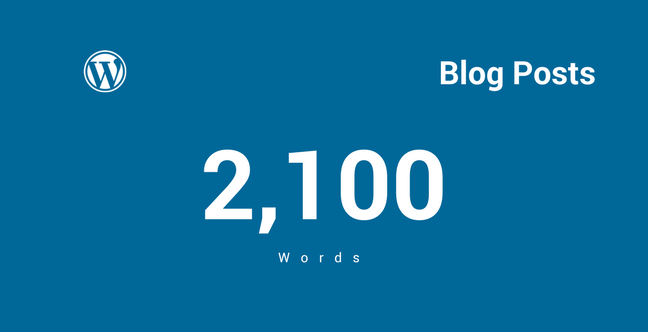
How long should a blog be? Something us, as writers often ask ourselves. In December 2013, a research was conducted by Medium contained the average number of seconds that readers spend on an article versus the length of the blog post.

An ideal blog post should not exceed a time limit of more than 7 minutes which makes an average or 2,100 words. That aligns with research previously conducted by serpIQ, which indicated that on average, the top 10 results for most Google searches are between 2,032 and 2,416 words.
Theoretically, longer content has a better chance of giving search engines an idea of the quality and topic of the page. Here, you might be thinking “What about Seth Godin? He often writes short blog posts!” Well, Seth Godin writes like Seth Godin. You write like you.
A person’s reading behavior is never all-the-time consistent but is based on factors such as how much time you have, your emotional state on the day, interest levels, and if you’re killing time. This doesn’t mean we should all start forcing our posts to match the ideal blog post length which goes by 7 minutes. There is no one-size-fits-all blog post length. Great posts perform well regardless of length, and bad posts certainly don’t get better when you stretch them out.
Ideal Blog Post Length: 2100 words, 7 minutes
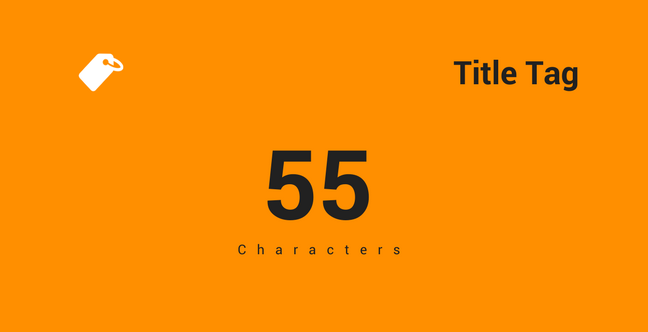
The title tag is what is used in the search engine result pages; so not only is it important for rankings, it is also important to catch the eye of searches to influence click-through. Of course, you’ll want to optimize which keywords you include in your title tag, but also be aware of the length.
The title length is 55 characters before Google will truncate the title with ellipses (…). Depending on the length of the words, that is an additional 2-4 words that can be added to the title tag. The cutoff point is around 60 characters. So use the target keyphrase and keep it short.
Ideal Length of Title Tag: 55 characters
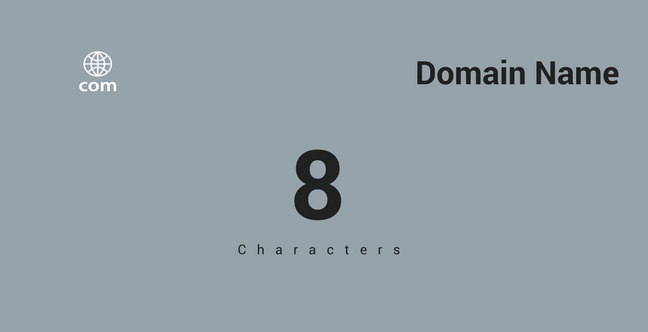
Like everything else on your site, your domain is either long or short. And just like everything else, length has a correlation with popularity. Here, a domain name is considered good if it is short and spells easy.
If you look at the top 250 high quality websites on the Internet, the average number of characters in their domains is 7-15. That’s pretty short. Here’s the data from a study conducted by Daily Blog Tips. The red line shows the average.

More than 70% of these domains are eight characters or fewer. Also, 86% were .com domains.
This clearly tells us that the optimal length for a domain name is 8 characters. Great domains are short, .com extensions and easy to remember.
Ideal Length of Domain Name: 8 characters
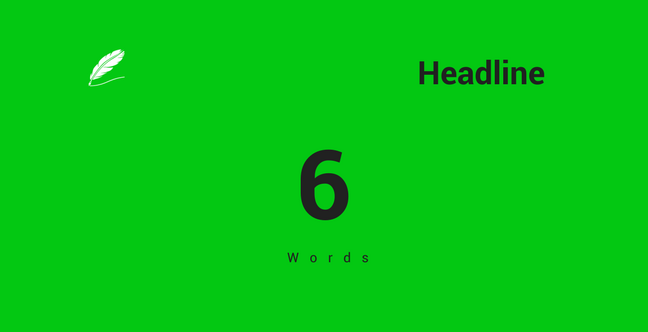
It’s one thing to write great content, but it’s another thing to get it read and ranked — which is where nailing the title comes in. Most of us are interested in the actual material of the article rather than its headline. It is the first thing a reader sees thus, having an attention grabbing phrase is vital.
Bnonn, a headline expert suggests that only the first three words are absorbed by most readers reading any headline. He recommends that in order to get your headline completely read, it is best to keep it within 6 words.
Ideal Length of Headline: 6 words
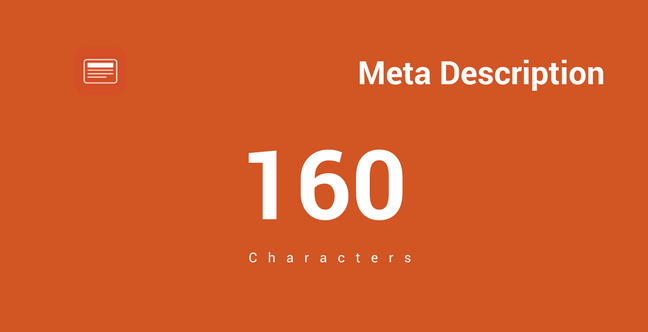
A meta description refers to the HTML attribute that explains the contents of a given webpage. It’s the short description you see on a SERP to “preview” what the page is about.

Google seems to cut off most meta descriptions — which are sometimes called snippets, after roughly two lines of text. In any case, it amounts to about 160 characters, though some particular outlet recommends keeping it at 155.
Up until recently, the maximum allowable characters in the meta description tag stood at 160. You might or might not know this but the length has increased by double to 320. In 2018, Moz’s data suggests that many snippets are exceeding 300 characters and I believe that is something that all of us can experiment on. Here’s an extra read from Moz (2018 edition) about how long should your meta description be: https://moz.com/blog/how-long-should-your-meta-description-be-2018
But until further data and acknowledgement (where every single result shows 300), I would suggest that you to try maintaining at an optimum of 160 characters. In the meantime, we will observe ourselves and update you when we have a conclusion.
Ideal Length of Meta Description: 160 characters
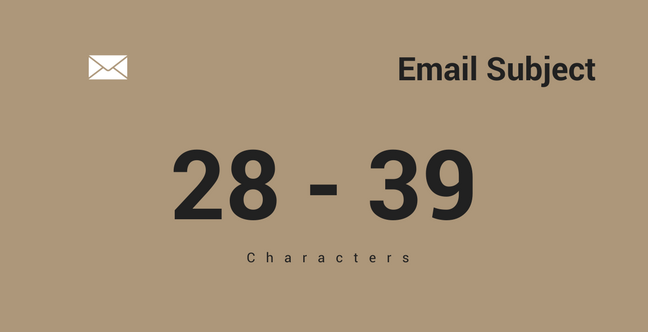
Most of our inboxes are a complete madhouse, so getting potential customers to open your marketing email is harder said than done. They say first impressions matter. This is certainly true for email subject headlines. One of the general best practice when writing it is to keep it in less than 10 words.
Need a convincing statistic? In September 2012, MailChimp published the following headline on its blog: Subject Line Length Means Absolutely Nothing.This was quite the authoritative statement, but MailChimp had the data to back it up. Their research found no significant advantage to short or long subject lines in emails. Clicks and opens were largely the same.
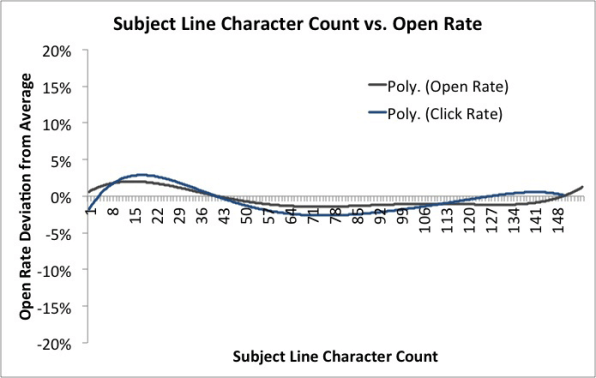
Clearly, there are a ton of different ways to approach writing a subject line, and length is equally as important to test as the rest of the elements. If you’re looking for a place to start your tests, the optimal length of 28 to 39 characters is a good bet.
Ideal Length of Email Subject Line: 28 to 39 characters
Beyond the ideal length, most importantly, you have to make sure you include the right targeted keywords.
Use BiQ’s Keyword Intelligence to access all the important keyword data to make an informed decision when choosing your keywords.
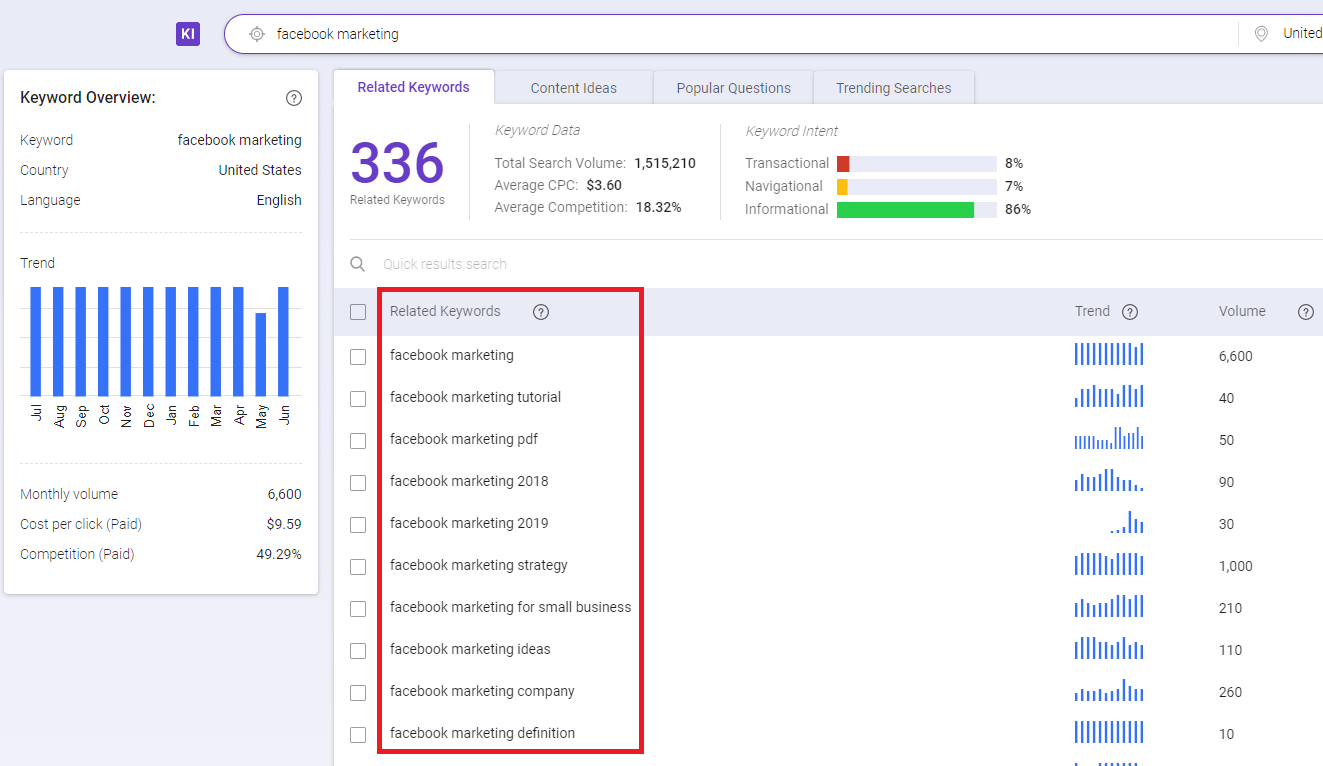
For longer content, you can also include semantically-related keywords and popular questions that your prospects are actually looking for.
Meanwhile, for social media content, explore the keyword’s search trend and plan them into your social media content at their height when people are talking about them.
I hope you’ve found some good insights through this blog. What’s right for many others in terms of best practices might not be exactly what your specific audience needs.
Experiment according to what fits you and your audience best. Those are not strict rules that you have to abide by but it sure is nice to have a guideline to begin, though.
What do you think of the ideal length for every content mentioned above? Would love to hear from you so do comment below and get the conversation rolling!
Updated: 29 June 2025

Winnie is an aspiring copywriter & internet marketer in the vast world of digital marketing. She's as curious as she can be; constantly hunting for answers to her questions, never saying no to new experiences. When she's not spending her time typing up a storm, she is at home keeping up with her never-ending movie marathon & books.
Struggling with internal linking?
Wish you could...

Automate internal linking

Use optimized anchor text

Fix 18 issues like orphan pages

Get link reporting and analytics
Precise, Simplified, Fast Internal Linking.


Save thousands of dollars (it’s 100x cheaper)

Zero risk of Google penalty (it’s Google-approved)

Boost your rankings (proven by case studies)
Rank High With This Link Strategy
Precise, Simplified, Fast Internal Linking.


Subscribe and receive exclusive insider tips and tricks on SEO.
Delivered to you right from the industry’s best SEO team.
Copyright © 2025 SEOPressor. All Rights Reserved.
Powered by Semantics BigData Analytics (SBDA).
